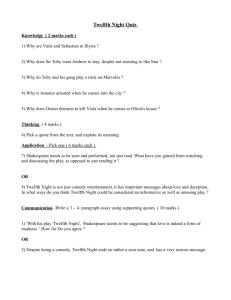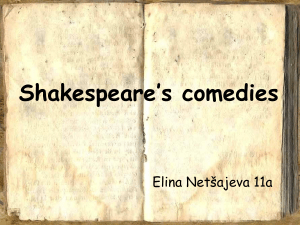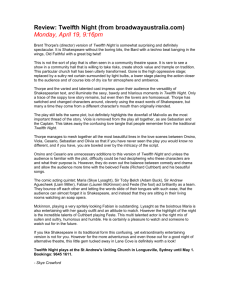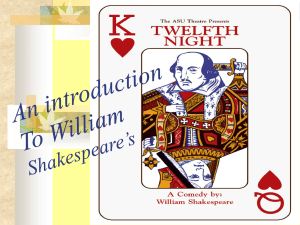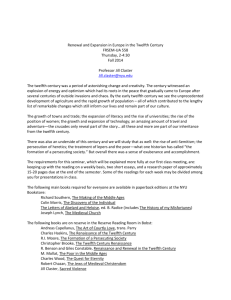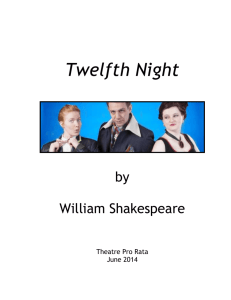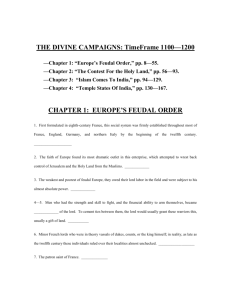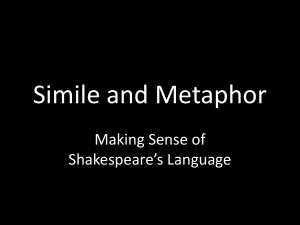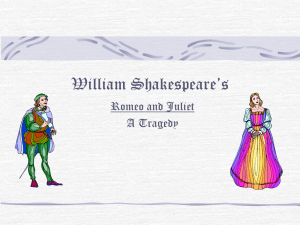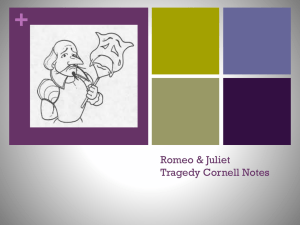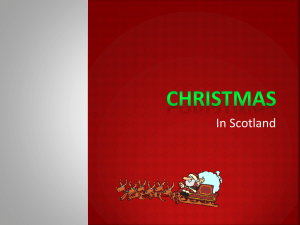Twelfth Night - Mounds View School Websites
advertisement
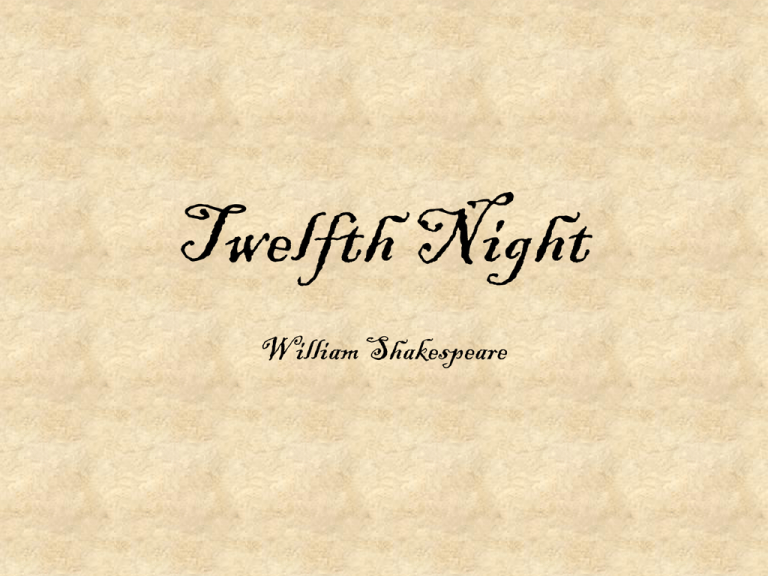
Twelfth Night William Shakespeare Setting: in Illyria, an ancient city along the Adriatic Coast of Italy Shakespearean Romantic Comedy: • • The main action is about love. The would-be lovers must overcome obstacles and misunderstandings before being united in harmonious union. The ending often includes weddings and a festive mood or celebration. Shakespearean Romantic Comedy: Frequently, contains elements of the improbable: unbelievable coincidences, improbable scenes of recognition/lack of recognition, disregard of the social order (nobles marrying commoners, beggars changed to lords). Shakespearean Romantic Comedy: The happy ending is brought about through supernatural or divine intervention or improbable turns of events. Shakespearean Romantic Comedy: Twelfth Night moves from a potentially tragic situation (shipwreck and loss) into the realm of romantic comedy (unions and reunions). The movement from conflict, sterility and death (two women who mourn supposedly dead brothers) to fertility, harmony and life (three couples happily celebrate marriages that may lead to future births) is typical of Shakespeare's comedies. Shakespearean Romantic Comedy: • In the best comedies, there is a philosophical aspect involving weightier issues and themes: personal identity; the importance of love in human existence; the disjunction between appearance and reality. Twelfth Night Celebration • Twelfth Night was first written for the festivities of the feast of the Epiphany (the "twelfth night" of Christmas, 1/6) Twelfth Night Celebration In Shakespeare's time, the Advent season was penitential, and the Christmas celebrating only began on December 25th. "Twelfth Night" is January 5-6, the twelfth night after Christmas. It marked the end of the festive season with the arrival of the wise men. It was a time for partying and gift-giving. T W E L F T H N I G H T Twelfth Night Celebration • Celebrated by breaking society's conventions: masters waiting on servants, and people being allowed to play whatever roles they wanted ("what you will"). o This "world upside-down" theme is reflected in the mismatched (potential) couples in the play and the themes of folly, madness and foolishness. Twelfth Night Celebration • In the UK, people used to have parties on Twelfth Night and it was traditional to play practical jokes on your friends and neighbors. – These included tricks such as hiding live birds in an empty pie case, so that they flew away when your startled guests cut open the crusts. Twelfth Night Celebration The subtitle is "What You Will", perhaps an invitation to invent your own title or even a reminder of the theme that happiness can be your own choice. Jester/Fool • In the era of kings, the court jester had one special privilege: to speak plainly to the king and tell him the blunt truth. • In "Twelfth Night", behind all the humor, both the jester and the play tell a truth that is happy and sad: Life is full of sadness. The best years of life are short. Events are cruel. And other people are cruel. In such a world, it is your DUTY to find and cherish whatever real happiness you can. Jester/Fool • Feste is a fool who seems to know more than most of the people around him. He is multi-dimensional, sometimes portrayed as a bit of a seer. He is a slightly tragic, sad character. – “Youth’s the stuff will not endure.” – "The rain it raineth every day." Puritanism The haunting fear that someone, somewhere, may be happy. -- H.L. Mencken • In "Twelfth Night" Malvolio gets called a "Puritan" – Tied to the play's major theme -- the search for happiness. • In Shakespeare's time, England's Puritans were members of the English national church who emphasized the authority of the Bible. Puritanism The haunting fear that someone, somewhere, may be happy. -- H.L. Mencken • Bible readers who applied the guidelines of scripture to their private and public lives • Refrained from pleasures that others considered harmless – Burned colorful church furnishings and smashed stainedglass windows as political expressions Puritanism The haunting fear that someone, somewhere, may be happy. -- H.L. Mencken • Wore drab clothing, stayed cold-sober, made holidays solemn instead of festive, and refused to do anything fun on Sunday • People disliked the Puritans for their "holier-than-thou" mentality and their agenda to force their conservative lifestyle on everyone Dramatic Literary Terms Monologue • One person speaking on stage. There may be other characters on stage too. – the Prince of Verona commanding the Capulets and Montagues to cease feuding PRINCE 81 Rebellious subjects, enemies to peace, 82 Profaners of this neighbor-stained steel— 83 Will they not hear? What, ho! you men, you beasts 84 That quench the fire of your pernicious rage 85 With purple fountains issuing from your veins, 86 On pain of torture, from those bloody hands 87 Throw your mistemper'd weapons to the ground, 88 And hear the sentence of your moved prince. 89 Three civil brawls, bred of an airy word, 90 By thee, old Capulet, and Montague, 91 Have thrice disturb'd the quiet of our streets, 92 And made Verona's ancient citizens 93 Cast by their grave beseeming ornaments, 94 To wield old partisans, in hands as old, 95 Canker'd with peace, to part your canker'd hate; 96 If ever you disturb our streets again, 97 Your lives shall pay the forfeit of the peace. 98 For this time, all the rest depart away: 99 You Capulet; shall go along with me: 100 And, Montague, come you this afternoon, 101 To know our further pleasure in this case, 102 To old Free-town, our common judgment-place. 103 Once more, on pain of death, all men depart. Soliloquy • A type of monologue in which a character directly addresses the audience or speaks thoughts aloud while alone on stage or while the other actors remain silent • In R & J, Romeo gives a soliloquy after the servant has fled and Paris has died. Aside • Words spoken, usually in an undertone not intended to be heard by all characters Literary Terms Allusion • An allusion is a reference to a well known work of art, music, literature, or history. “At lovers’ perjuries, they say Jove laughs.” (Act II, Sc. 2) – Jove is another name for Jupiter, the Roman King of the Gods. Pun A form of wit (not necessarily funny) based on words with several meanings, or words that sound alike but have different meanings; in plays this can help deliver dramatic irony because the audience gets the double meaning while the characters do not Mercutio – “Nay, gentle Romeo, we must have you dance.” Romeo – “Not I, believe me. You have dancing shoes / With nimble soles; I have a soul of lead…” Dramatic Irony • A contradiction between what a character thinks and what the reader/audience knows to be true – Lord Capulet’s servant invites Romeo to the party. He doesn’t know that Romeo is a Montague, but we do. Verbal Irony • Words used to suggest the opposite of what is meant Juliet - “Farewell, God knows when we shall meet again.” (Act 4, scene 3) Juliet says goodbye to her mother and nurse knowing that she will never see them again. Situational Irony An event occurs that directly contradicts the expectations of the characters, the reader, or the audience In Shakespeare's play young lovers, the do end up spending eternity together, but not in the way the audience had hoped. On to Act I The End
